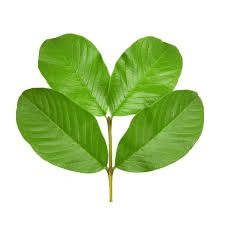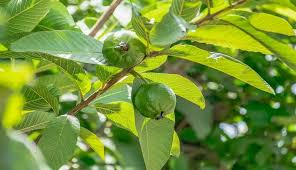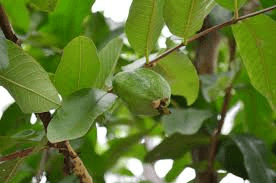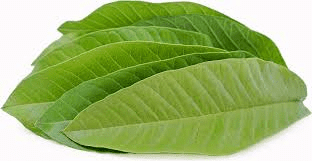Guava leaves, often overlooked in favor of the fruit, are a treasure trove of health benefits and have been used in traditional medicine for centuries. These leaves, characterized by their oval shape and bright green color, are packed with a variety of bioactive compounds that contribute to their medicinal properties.
One of the primary components of guava leaves is a group of antioxidants known as flavonoids, including quercetin. These antioxidants play a crucial role in protecting the body from oxidative stress, which is linked to various chronic diseases such as heart disease, diabetes, and cancer. Quercetin, in particular, has anti-inflammatory and anti-allergic properties, making guava leaves beneficial for reducing inflammation and alleviating allergy symptoms.
Another significant compound found in guava leaves is tannins. Tannins have astringent properties, which can help in tightening and toning tissues. This makes guava leaves effective in treating diarrhea and dysentery, as they can reduce the secretion of fluids in the intestines and inhibit the growth of harmful bacteria. The antimicrobial properties of tannins also make guava leaves useful in promoting oral health by combating bacteria that cause gum disease and bad breath.
Guava leaves are also rich in vitamins and minerals, including vitamin C, vitamin A, potassium, and magnesium. Vitamin C, a potent antioxidant, boosts the immune system, promotes skin health, and aids in the absorption of iron. Vitamin A supports vision and immune function, while potassium and magnesium are essential for maintaining heart health, muscle function, and bone health.
The leaves have been traditionally used to manage blood sugar levels, particularly in people with diabetes. Studies have shown that guava leaf extract can improve blood sugar control by inhibiting enzymes that convert carbohydrates into glucose, thereby reducing the absorption of sugar in the bloodstream. This makes guava leaves a natural remedy for managing diabetes and preventing spikes in blood sugar levels.
In addition to their internal benefits, guava leaves can also be applied topically to treat various skin conditions. Their antibacterial and anti-inflammatory properties make them effective in treating acne, preventing infections, and promoting wound healing. A simple paste made from crushed guava leaves can be applied to the skin to reduce inflammation, fight bacteria, and soothe irritation.
Guava leaves can be consumed in several ways to reap their health benefits. One popular method is to brew them into a tea. Guava leaf tea is easy to make: simply boil fresh or dried leaves in water for about 10 minutes, strain, and enjoy. This tea can be consumed daily to support digestive health, boost the immune system, and manage blood sugar levels. The leaves can also be used in extracts, powders, or supplements, which are available in health food stores.
In summary, guava leaves are a potent natural remedy with a wide range of health benefits. Their high content of antioxidants, vitamins, and minerals, along with their antimicrobial and anti-inflammatory properties, make them valuable for promoting overall health and well-being.
Whether used to treat digestive issues, manage blood sugar levels, support skin health, or boost the immune system, guava leaves are a versatile and beneficial addition to both traditional and modern medicine. By incorporating guava leaves into your diet or skincare routine, you can take advantage of their powerful health-promoting properties.
The Economic Importance and Uses of Guava Leaves

1. Medicinal Uses: Guava leaves are used in traditional medicine for treating diarrhea, dysentery, and other digestive issues due to their antimicrobial properties.
2. Antioxidant Source: The leaves are rich in antioxidants, which are used in supplements to promote overall health and prevent oxidative stress.
3. Natural Pesticide: Extracts from guava leaves can be used as natural pesticides, reducing the need for chemical alternatives.
4. Skincare Products: Guava leaf extract is used in skincare products to treat acne and improve skin health due to its anti-inflammatory properties.
5. Hair Care: Guava leaves are used in hair care products to reduce hair loss and promote growth due to their nutrient content.
6. Tea Production: Guava leaves are dried and used to make herbal teas that aid digestion and provide other health benefits.
7. Weight Loss Supplements: The leaves are included in weight loss supplements due to their ability to help regulate blood sugar levels and reduce appetite.
8. Oral Health: Chewing guava leaves or using guava leaf extract in mouthwash helps maintain oral hygiene and prevent gum disease.
9. Antidiabetic Agents: Guava leaves are used in managing diabetes as they help lower blood sugar levels.
10. Anti-inflammatory: The leaves are used in various formulations to treat inflammation and pain.
11. Antimicrobial Agents: Guava leaf extracts are used in natural remedies to treat bacterial and fungal infections.
12. Natural Dye: The leaves can be used to create natural dyes for textiles and crafts.
13. Feed Additive: Guava leaves can be added to animal feed to enhance the nutritional value and promote health.
14. Aromatherapy: Essential oils extracted from guava leaves are used in aromatherapy for their calming and therapeutic effects.
15. Fertilizer: The leaves can be composted and used as organic fertilizer to enrich soil.
16. Biofuel Production: Guava leaves can be used in the production of biofuels through fermentation processes.
17. Perfumes: The leaves are used in the production of natural perfumes and fragrances.
18. Eco-friendly Packaging: Guava leaves can be used as natural packaging material, especially for food items, to reduce plastic use.
Read Also: Layers or Broilers: Find Out which is More Profitable in Poultry Business
The Products and By-products That Can Be Derived From Guava Leaves

1. Herbal Tea: Guava leaves are dried and used to make herbal teas that are beneficial for digestion and overall health.
2. Essential Oils: Oils are extracted through steam distillation and used in aromatherapy and cosmetics.
3. Natural Pesticides: Extracts from guava leaves are processed into natural pesticides for agricultural use.
4. Skincare Products: Guava leaf extracts are used in creams and lotions to treat acne and improve skin health.
5. Hair Care Products: Shampoos and conditioners containing guava leaf extracts help reduce hair loss and promote growth.
6. Nutritional Supplements: The leaves are processed into powders or extracts for use in dietary supplements.
7. Mouthwash: Guava leaf extracts are used in natural mouthwashes to promote oral health.
8. Antidiabetic Supplements: The leaves are processed into supplements to help manage blood sugar levels.
9. Natural Dyes: Guava leaves are boiled to extract pigments for dyeing fabrics naturally.
10. Compost: Guava leaves are composted to create nutrient-rich organic fertilizer.
11. Biofuel: The leaves undergo fermentation to produce biofuels, providing a renewable energy source.
12. Perfumes: Essential oils from guava leaves are used in natural perfumes and fragrances.
13. Feed Additives: The leaves are dried and ground to be used as additives in animal feed.
14. Anti-inflammatory Creams: Extracts from the leaves are used in creams to treat inflammation and pain.
15. Antimicrobial Solutions: Guava leaf extracts are processed into antimicrobial agents for use in natural remedies.
16. Aromatherapy Oils: Essential oils from guava leaves are used in aromatherapy for their therapeutic properties.
17. Eco-friendly Packaging: Fresh or treated guava leaves are used as eco-friendly packaging materials.
Read Also: How to Make Good Money from Africa’s love of Poultry Chicken and Eggs
Frequently Asked Questions (FAQ’s) About Guava Leaves

1. What are the health benefits of guava leaves?
Guava leaves are known for their antimicrobial, anti-inflammatory, and antioxidant properties, making them beneficial for overall health.
2. How do guava leaves help in weight loss?
Guava leaves can help regulate blood sugar levels and reduce appetite, aiding in weight management.
3. Can guava leaves treat acne?
Yes, the anti-inflammatory properties of guava leaves can help reduce acne and improve skin health.
4. Are guava leaves effective for managing diabetes?
Guava leaves can help lower blood sugar levels, making them useful in managing diabetes.
5. How can guava leaves be used for oral health?
Chewing guava leaves or using guava leaf extract in mouthwash can help maintain oral hygiene and prevent gum disease.
6. Can guava leaves be used as a natural pesticide?
Yes, extracts from guava leaves can be used as natural pesticides in agriculture.
7. What is the process of making guava leaf tea?
Guava leaves are dried and steeped in hot water to make herbal tea.
8. How do guava leaves promote hair growth?
Guava leaves contain nutrients that strengthen hair follicles and reduce hair loss.
9. Can guava leaves be used in skincare products?
Yes, guava leaf extracts are used in creams and lotions to improve skin health and treat acne.
10. What are the uses of guava leaf essential oils?
Guava leaf essential oils are used in aromatherapy, perfumes, and natural health remedies.
Read Also: How to Make Your Own Organic Pesticides

